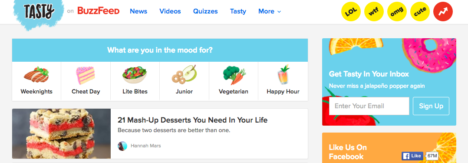Monetising exploding watermelons: Inside Buzzfeed’s video strategy
Buzzfeed continues to push its credentials as video content maker. Mumbrella met with key senior leadership team members, including editor-in-chief Ben Smith, in New York, to discuss the strategy behind the publisher's online video push.
You wouldn’t think there was much strategy or insight behind wrapping a watermelon with rubber bands until it explodes, but Buzzfeed editor-in-chief insists there was.
“It was this very pure form of storytelling,” says Smith, explaining why 800,000 people watched the watermelon explosion live on Facebook and a further 10m people have watched the video afterwards. “It was just pure suspense.”
Smith understands that a lot of Buzzfeed’s critics will see it as trivial but the editor of one of the most high-profile news websites in the world insists those naysayers are missing something.
“This medium (online live video) is in its infancy and it’s fascinating to see how it develops,” he says. “There’s a lot we can learn from that. How do you take that insight into other spaces, i.e. news is certainly being one of them.”
Nine-year-old Buzzfeed describes itself as a “social news and entertainment company” and it’s interesting to get Smith’s view on where the website sits when its comes the balance between the “light and shade” of entertainment versus hard news.
“I think it’s our general view that people, consumers, want to be entertained and also want to know what’s going on in the world,” says Smith. “People want to know how to make pizza cones but also want to know who’s going to be President. We do a lot of different things.”
Smith notes though that reader demand has been the major driver in the push towards online video – particularly in areas such as food.
“Certainly in the past we have seen this explosion in digital video and I think that led us to create things like Tasty (Buzzfeed’s food brand).
 “It’s not like we went into last year saying we want to build the biggest food video network in the world but that is how it turned out and that really grew out of, I think out of our culture more than out of some kind of… yeah. It’s a huge source of energy for us.”
“It’s not like we went into last year saying we want to build the biggest food video network in the world but that is how it turned out and that really grew out of, I think out of our culture more than out of some kind of… yeah. It’s a huge source of energy for us.”
In a commercial sense Buzzfeed claims its strategy is paying dividends in terms of advertiser response.
“Being a mobile-first video component resonated extremely well,” says Lee Brown, chief revenue officer at Buzzfeed.
“Clients like the programming aspect (of TV) and so we’ve had to talk a lot about creation in terms of how we think about programming for niche audiences and enabling the user to contribute to the piece, leaving space in the media for the user to participate.”
Asked to elaborate, Brown cites Australia as a market which is starting to understand what is a shift in mentality.
“Ever since content became less about consumption and more about using it as a form of expression to say who you are as an identity piece, or using it for information or emotional gift and so forth and that is something which has resonated in Australia,” he says, citing the experience of Buzzfeed Australia.
Brown cites the fact that the publisher has just had sign off on its first sponsored native video from Vodafone, which attracted 1.1m Facebook views, as an example of this.
“Marketers hadn’t necessarily been thinking about these kind of creation tools but this is something we have helped bring to the marketplace.”
Despite the bravado in the video realm, Buzzfeed and a number of the vanguard of the digital publishers like Mashable have been under real financial pressure with the latter this year cutting staff.
Asked about April’s financial results, which saw Buzzfeed forced to cut its 2016 revenue target from $500m to $250m after missing this year’s target by $80m, it’s clear that Brown is unwilling to discuss further.
“We’re very excited about our progress,” Brown said, declining to address the question. “We’re excited about the growth that we’re seeing this year and the traction that we have across all of our different revenue product, and across our different geographies.”
However, one thing that is clear is that Buzzfeed’s senior leadership in the US is very engaged in said geographies, particularly Australia.
“We’ve hired Marni Cordell,” says Smith excitedly, referencing its decision, earlier this year, to hire Crikey editor Marni Cordell to be its news editor. “I keep hearing ‘she’s a ‘gun’. I don’t exactly know what means, but I like it.”
Smith is also effusive about the growth the local operation and it’s clear that he is engaged in the unique journalistic culture that Australia has.
“We’ve always felt that Australia was hospitable for us; honestly, because it has a real vibrant news culture and a culture that also embraces crazy news,” he says.
“The fact that The Walkleys gave an award for the best headline, to “I stuck a cracker up my clacker” is incredible. The Pulitzers do not have that, and I was very impressed by that.”
“Australia has this really strong media culture, kind of across that whole spectrum from crazy internet stuff to really, really hard reporting.
“It’s a place where people are really comfortable with both, and with both things living together, and that’s something that makes it pretty natural fit for us.”





